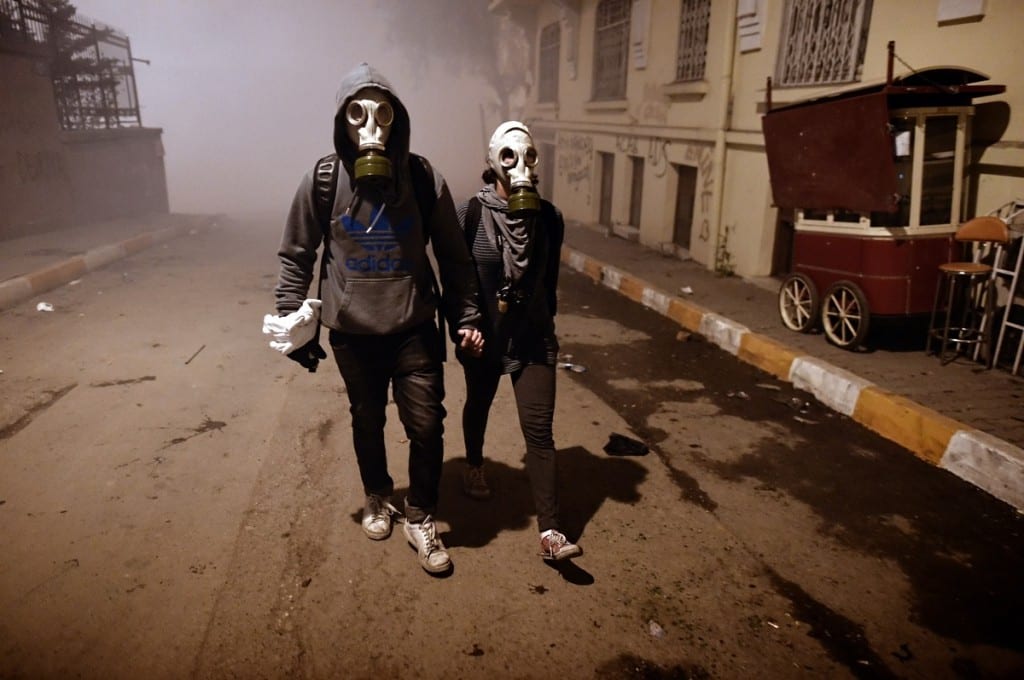Turkish Media Slammed For Ignoring Massive Protests (VIDEO)
How much better do you think the American media would be under similar circumstances?
AP | By By ELENA BECATOROS and EZGI AKIN –Posted: 06/04/2013 3:03 pm EDT | Updated: 06/04/2013 5:45 pm EDT
HUFFPO
As Istanbul was convulsed by some of the most severe anti-government protests Turkey has seen in decades, the country’s broadcast media looked away. Regular newscasts briefly mentioned the protest, before moving on to other topics. There was no word of the violence, of the riot police clashing with protesters for hours, or of the many injured in what even Prime Minister Recep Tayyip Erdogan later said might have been unnecessarily heavy-handed tactics.
Turks were outraged. They turned to social media in droves; Twitter and Facebook updates were virtually the only means of finding out what was going on in Istanbul, where tens of thousands of protesters were facing off against riot police.
Visit NBCNews.com for breaking news, world news, and news about the economy
A furious Erdogan lashed out. “There is now a menace which is called Twitter,” he said Sunday, dismissing the protests as demonstrations organized by an extremist fringe. “The best examples of lies can be found there. To me, social media is the worst menace to society.”
But to many in Istanbul, it was a lifeline. As word spread through cyberspace, more and more people crowded onto Taksim Square, where protests began last Friday over government plans to rip up trees in neighboring Gezi Park to make way for reconstructed Ottoman-era barracks and a shopping mall. Eventually, the outcry was too loud to ignore. Television stations gradually began showing snippets of the protests during the weekend, until many had near-blanket coverage by Monday night.
But the damage had been done. In the days of protest that have ensued, demonstrators held up placards lambasting the media, criticizing them for keeping the public in this country of about 75 million uninformed and turning a blind eye to events that quickly spread from Istanbul to the capital, Ankara, and other cities.
On Sunday and Monday, protesters converged outside the offices of the private NTV and HaberTurk television stations. Some held placards depicting the country’s three main private television stations as the three wise monkeys, who see no evil, speak no evil and hear no evil. In Taksim, protesters overturned an NTV satellite van, smashing its equipment and ripping the doors almost off their hinges. The battered, graffiti-covered shell still stood on the square on Tuesday morning.
In a country where authorities have few qualms about jailing outspoken journalists, many have accused the media — particularly TV — of self-censorship, shying away from anything that could anger the establishment and Erdogan’s government.
Some television personalities turned to more subtle ways of making their views known. A popular quiz show on the Bloomberg-HT channel, Word Game, made the protests the theme of Monday night’s competition. Host Ihsan Varol asked competitors what “must be done to decrease tension?” The correct answer was one of the protesters’ main demands of the heavy-handed police in Istanbul and other cities: “Withdrawal.”
The Hurriyet newspaper ran a sly cartoon on its front page featuring penguins holding up a banner with a main protest theme, “Everywhere is Taksim, the Struggle is Everywhere.”
The lack of coverage wasn’t lost abroad either. Council of Europe Secretary General Thorbjorn Jagland issued a statement calling for the investigation of allegations of excessive force by the police, and urging “all media outlets to provide full and accurate coverage of the situation.”
Turksih media and business executives got the message from the public. Dogus, one of Turkey’s most prominent business conglomerates, which owns NTV, as well as banking, insurance and marina construction interests, apologized for the lack of coverage on the first night of riots.
“Our audience feels like they were betrayed,” NTV quoted Dogus CEO Cem Aydin as saying Tuesday after meeting with the channel’s staff, adding that the criticism against the station was “fair to a large extent.”
“Our professional responsibility is to report everything as in the way it happens. The pursuit of balance within the imbalanced environment affected us as it did the other media outlets,” Aydin said, adding that was now “an opportunity to refresh our relationship with our audience.”
Customers made their displeasure known in more concrete ways, too. Garanti Bank, which also belongs to Dogus, has seen some 1,500 debit and credit card holders closing their accounts in protest, the bank’s general director said.
“They are saying ‘I am a Granati customer for 20 years, I don’t have any problem with the bank, yet I am closing my account due to these incidents’,” Ergun Ozen told the Associated Press.
“In sum, there have been some 40 million (Turkish lira, about $16 million) cash outflow and some 1,500 credit cards have been cancelled due this. Yet, apart from these incidents, in general the bank’s deposit is increasing.”
Ozen said that while he believed this reaction was unfair to Garanti Bank, “I met people’s reaction with understanding.”
Akin reported from Ankara. Suzan Fraser in Ankara also contributed to this report.
